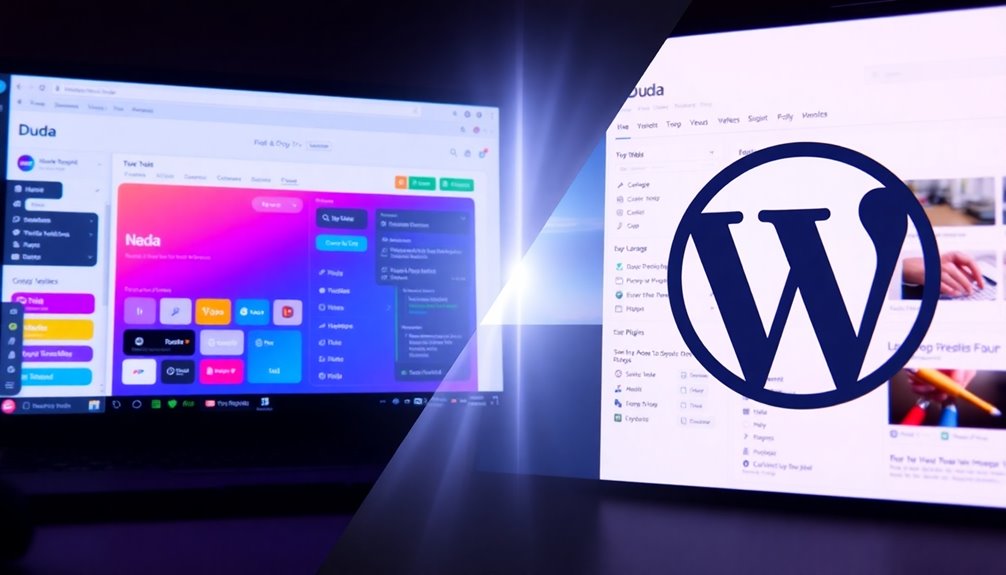When choosing between Duda and WordPress, consider your specific needs. If you want a quick, user-friendly setup, Duda's drag-and-drop interface and range of customizable templates are perfect for beginners and small businesses. It's easier to manage and starts at $14/month, providing built-in security and excellent customer support. However, if you need extensive customization and control, WordPress offers a vast array of plugins but can be overwhelming for newcomers. Its free access can lead to hidden costs. Ultimately, your decision should reflect your project's complexity and your technical skills. You'll find more insights to guide your choice ahead.
Platform Overview
When you're deciding between Duda and WordPress, it helps to understand their fundamental differences.
The Duda website builder offers a user-friendly drag-and-drop interface, making it perfect for beginners or agencies needing quick setups. With over 100 customizable templates, you can create a site without coding. Additionally, using WordPress backup plugins is vital for safeguarding your website against data loss. Regular backups are essential to protect data from hacking, ensuring your site remains functional and secure.
On the other hand, WordPress is a powerful content management system (CMS) that excels in versatility. It supports countless plugins and themes, allowing for extensive customization tailored to your unique needs. While Duda includes built-in SEO and e-commerce tools within its subscription model, WordPress requires separate hosting and domain registration, relying on plugins to enhance its functionality. Additionally, using secure backup plugins ensures that your website data is protected against potential losses.
Your choice will depend on your comfort level with technology and the complexity of your website requirements.
Target Users
When choosing between Duda and WordPress, it's important to contemplate who you're as a user.
If you're an agency or a beginner looking for quick and easy website creation, Duda's user-friendly interface might be your best bet. Additionally, selecting the right hosting provider can greatly enhance your website's overall performance optimization and security. A reliable provider with 99.9% uptime guarantees ensures consistent accessibility for your site.
On the other hand, if you're a developer seeking extensive customization and control, WordPress offers the flexibility you need to meet specific project demands. Additionally, many users appreciate the benefits of choosing the right hosting provider, which can significantly impact the performance and security of their WordPress site.
Ideal User Profiles
Choosing the right website builder hinges on understanding your needs and skill level.
If you're a non-coder or a small business owner, Duda could be your best bet. Its drag-and-drop interface and pre-designed templates allow you to create a website quickly without technical expertise.
On the other hand, if you're a developer or an advanced user, WordPress might suit you better. It offers extensive customization and flexibility with thousands of plugins and themes, perfect for building complex sites.
Duda also appeals to agencies needing collaborative features for faster project turnarounds, whereas WordPress excels for those wanting powerful eCommerce solutions.
Knowing these ideal user profiles will help you make an informed choice.
Agency vs. Individual Needs
Understanding the distinct needs of agencies versus individual users can greatly influence your choice between Duda and WordPress.
If you're part of an agency, Duda's fast development times and robust collaboration tools can markedly enhance your workflow, leading to increased efficiency and a strong ROI within a year.
On the other hand, individual users or small business owners might find Duda's user-friendly drag-and-drop interface perfect for rapid website creation, especially if you lack coding skills.
While agencies may prioritize extensive customization options found in WordPress's vast plugin library, individual users often prefer the simplicity of Duda's pre-designed templates.
Ultimately, your choice should align with whether you're seeking agency-level capabilities or a straightforward solution for personal use.
Pricing Comparison

When it comes to pricing, you'll find that Duda offers a clear cost structure starting at $14 per month.
In contrast, WordPress can lead to unexpected expenses with separate hosting and premium features. Regular backups are essential for maintaining website integrity and can incur additional costs depending on the chosen backup solutions. For instance, plugins like UpdraftPlus can provide both manual and automated backup options, which add value to your WordPress experience.
You'll need to weigh the value for money each platform provides based on your specific needs. Understanding these differences will help you make a more informed choice for your website. Additionally, considering options like Google Drive's free storage can aid in managing backup costs effectively.
#
Cost Structure
Analysis
Evaluating the cost structure of Duda and WordPress reveals significant differences that can impact your decision.
Here's a breakdown of the costs associated with each platform:
- Duda: Pricing starts at $14 per month, with higher tiers reaching $44, including hosting and essential features.
- WordPress: While it's free to use, you'll likely spend $500-$700 annually on hosting, domains, and premium plugins, plus potential hidden costs for themes and additional functionalities.
- Long-term Costs: You might save $138.12 per year with WordPress, but don't forget maintenance and security expenses can add up.
Duda's straightforward pricing contrasts with WordPress's potential hidden costs, making budgeting easier when choosing the right platform for your needs.
Value for Money
Value for money is a crucial factor in deciding between Duda and WordPress. Duda's pricing starts at just $14/month, covering hosting and essential features, which simplifies your budgeting.
In contrast, while WordPress is free, the hidden costs for hosting, domain registration, and plugins can add up to $500-$700 annually. Although you might find long-term savings of about $138.12 per year with WordPress, this often depends on your hosting choices.
Duda's straightforward pricing structure can be more cost-effective for those with basic needs, especially since its higher-tier plans include features that help agencies manage multiple clients without extra plugin costs.
Ultimately, weigh your needs and the potential hidden costs of WordPress against Duda's clarity.
## Cost Structure
Understanding the cost structure of Duda and WordPress can greatly impact your decision on which platform to choose for your website.
Here's a quick breakdown:
- Duda's Pricing Structure: Starts at $14/month, including hosting, domain registration, and essential features.
- WordPress Users: While WordPress is free, additional costs for hosting, domain, and premium themes/plugins can lead to annual expenses of $500 to $700. Additionally, choosing a reliable hosting provider can significantly enhance site performance and reduce unexpected expenses. With WordPress, users must also consider regular updates to themes and plugins to maintain security and functionality, which can incur further costs.
- Budgeting Simplicity: Duda simplifies budgeting with bundled services, whereas WordPress users may encounter hidden costs due to multiple plugins and services. Regularly monitoring site speed and performance can help avoid additional costs caused by slow load times and poor user experience.
Ease of Use

When it comes to ease of use, Duda stands out with its intuitive drag-and-drop interface, allowing you to create websites effortlessly, even if you have minimal technical skills.
Duda features a straightforward setup process, enabling you to select templates with just one click, which considerably reduces the time spent compared to WordPress installation's complex steps. Users often report building websites in about a quarter of the time it takes with WordPress, showcasing Duda's efficiency. Additionally, it's crucial to consider that PHP version must be 7.4 or higher to avoid compatibility issues when using WordPress. Furthermore, Duda provides a seamless user experience which enhances user engagement and satisfaction.
Duda provides a single dashboard for managing multiple websites, making navigation and asset sharing seamless.
With a user-friendly design and dedicated customer support, Duda guarantees you can effectively manage and maintain your site without needing extensive technical knowledge. Furthermore, Duda's simplicity can be contrasted with WordPress installation steps, which require a series of detailed actions to set up.
User Experience
When it comes to user experience, you'll find notable differences between Duda and WordPress.
Duda's drag-and-drop interface makes it easy for you to build a site without much technical knowledge, while WordPress can have a steeper learning curve due to its extensive settings and plugins.
Understanding these design elements can help you choose the platform that best fits your needs.
Interface Design Comparison
Maneuvering the interface of a website builder can make all the difference in your experience, especially for those without a technical background.
When comparing Duda and WordPress, you'll notice some key differences:
- User-friendliness: Duda boasts a 90% score, while WordPress sits at 83%, making Duda more accessible.
- Admin panel simplicity: Duda's admin panel is rated at 92%, contrasting with WordPress's 85%, highlighting Duda's easier traversal.
- Efficiency: Duda's one-click template selection streamlines creation, while WordPress requires traversing multiple settings and plugins, increasing setup time.
Learning Curve Analysis
The ease of maneuvering a website builder directly impacts how quickly you can bring your ideas to life.
Duda shines with its intuitive drag-and-drop interface, making it user-friendly even for those with minimal technical skills. You'll notice a significant reduction in build time—up to 50% faster than WordPress—allowing you to focus on creativity rather than technical details.
Duda's single dashboard simplifies management capabilities for multiple sites, while WordPress requires separate logins, complicating your workflow. Designed for non-developers, Duda provides thorough support, catering to various skill levels.
In contrast, WordPress's extensive plugin library can overwhelm beginners, creating a steep learning curve. If you prioritize ease of use and efficiency, Duda is the clear choice.
Customization Options

Customization options can markedly impact your website's functionality and appearance. If you're deciding between Duda and WordPress, consider the following:
- WordPress: With over 59,484 free plugins and themes, WordPress offers nearly limitless customization capabilities, allowing you to deeply personalize your site.
- Duda: This platform provides over 100 customizable templates, focusing on ease of use but limiting extensive customization options compared to WordPress.
- Flexibility: WordPress's open-source nature allows developers to create unique functionalities, while Duda's proprietary platform offers a more straightforward user experience, making it easier for non-developers but with less flexibility.
Ultimately, your choice will depend on how much customization you need for your website.
Functionality
When it comes to functionality, your choice between Duda and WordPress can considerably affect your website's performance and capabilities.
WordPress shines with over 59,484 free plugins, giving you the freedom to customize your site extensively. This vast selection allows you to enhance functionality tailored to your unique business needs, making it a powerful CMS.
On the other hand, Duda offers a smaller app store with integrated tools, which means you'll have fewer options for customization. While Duda's functionality is streamlined and user-friendly, it may not meet the demands of businesses requiring extensive features.
Ultimately, if you prioritize flexibility and a wide range of plugins, WordPress might be the better choice for your website's functionality.
Security Features

While choosing a platform for your website, security features should be a top priority. Duda and WordPress offer different approaches to security, and understanding them can help you make an informed choice.
- Duda Security: Automatic SSL certificates, regular updates, and DDoS protection provide a secure environment without extra configuration.
- WordPress Security: Heavily reliant on user-implemented plugins, which can introduce vulnerabilities if not managed properly.
- Enhanced Protections: Duda includes a Web Application Firewall (WAF) and two-factor authentication (2FA), while WordPress needs third-party solutions for similar protections.
Performance Metrics
Understanding performance metrics is crucial for guaranteeing your website runs smoothly and effectively engages visitors.
When comparing Duda and WordPress, Duda stands out with a remarkable 99.99% monthly uptime, minimizing downtime issues you might face with WordPress due to plugin conflicts.
Duda's built-in SEO features help 64% of its websites pass Core Web Vitals, while only 28% of WordPress sites achieve this.
Additionally, Duda automatically optimizes website speed through efficient code and a Content Delivery Network (CDN), enhancing load times without requiring any effort from you.
With Google Lighthouse optimization included, Duda guarantees that performance metrics are continuously monitored and improved, whereas WordPress often demands manual optimization to address site-slowing issues related to plugins.
Customer Support

Effective customer support can make all the difference in your website-building experience, and Duda excels in this area.
With Duda, you get dedicated support that's available 24/5 via email and live chat, ensuring you receive timely assistance. In contrast, WordPress relies mainly on community forums, leading to variable support experiences.
Here are three key advantages of Duda's customer support:
- Multiple Contact Methods: Duda offers phone, email, and chat support, making it easy for you to reach out.
- Quick Resolution Times: Users often report faster issue resolution compared to WordPress's decentralized approach.
- Collaboration Tools: Duda provides tools that help agencies manage multiple projects and client communications more efficiently.
When it comes to customer support, Duda truly stands out.
E-commerce Solutions
When you're looking to set up an online store, choosing the right platform can greatly impact your success.
Duda offers a streamlined eCommerce solution tailored for small businesses, allowing you to quickly set up a Duda eCommerce store with user-friendly tools and built-in security features.
On the other hand, WordPress hosting provides extensive customization options through various eCommerce plugins and integrations like WooCommerce, which can be beneficial for complex sites.
However, achieving peak performance on WordPress may require additional optimization efforts.
If you prefer a faster, hassle-free experience, Duda's pre-designed templates simplify the setup process.
Ultimately, your choice should align with your business needs and technical expertise for an effective online store.
Conclusion
In the grand tapestry of website creation, choosing between Duda and WordPress is like selecting the perfect brush for your canvas. If you crave simplicity and support, Duda weaves a seamless experience. However, if flexibility and vast possibilities spark your creativity, WordPress opens a world of customization. As you commence on this journey, envision your ideal site flourishing, and let your unique vision guide you to the platform that resonates most with your ambitions.



